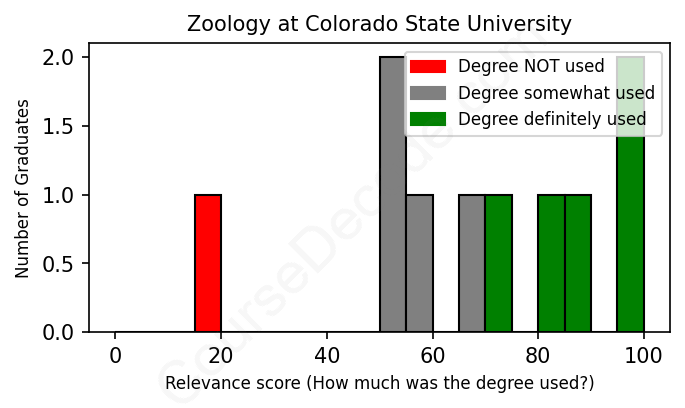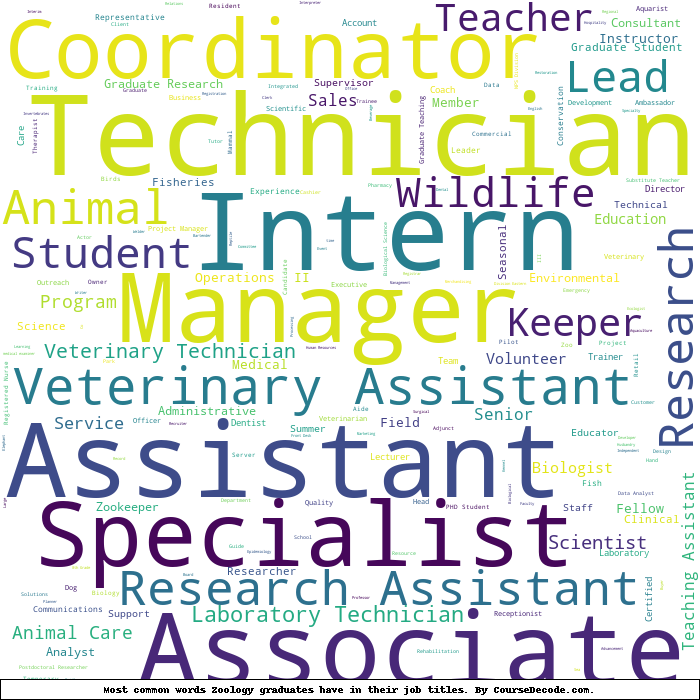
First, some facts. Of the Zoology graduates from Colorado State University we've analyzed , here's how many have used (or NOT used) their degree in their career:

These are estimates based on AI analysis of 10 LinkedIn profiles (see below).
The verdict? On par with the average. Overall, with an average relevance score of 67%, Zoology graduates from Colorado State University have about the same likelihood of finding work in this field as the average graduate across all fields:
And for comparison, here's the chart for all profiles we've looked at across all degrees.
Also, after graduating, only 20% of these graduates have pursued further education other than another Bachelor's degree (such as a Masters degree or other), compared to the average across all profiles of 35%. This suggests a Bachelors degree is enough for most Zoology graduates, and it's normal to look for work straight after graduation.
See the details:
|
Relevance score: 81% We think this person has gone into a career highly relevant to their degree. We think this person has gone into a career highly relevant to their degree.
DEGREE INFOGraduated in 2020 from Colorado State University with a Bachelor's degree in Zoology. Also pursued further education since (see below). JOB HISTORY SINCE GRADUATIONLaboratory Technician Paradigm Laboratories Jan 2021 - May 2021 Swim Instructor/LIfeguard  Pomeroy Recreation & Rehabilitation Center Aug 2021 - May 2022 CoastWatch Satellite Intern  NOAA: National Oceanic & Atmospheric Administration May 2022 - Sep 2022 Lab Prep TA  San Francisco State University Aug 2021 - Dec 2021 National Institute of Health Graduate Research Fellow  San Francisco State University Aug 2021 - Present Associate Researcher  Eagle Rock Analytics Jul 2023 - Present FURTHER DEGREES DONE SINCE GRADUATINGMaster's degreeSan Francisco State University 2021 - 2023 ABOUTI am a masters student at San Francisco State University studying how climate change impacts anemone symbiosis within the rocky intertidal.Broadly, I have lab and field experience studying plants, amphibians, and marine invertebrates. I am proficient in Python, Excel/Sheets, and data analysis. I am adept at flow cytometry, fluorescence microscopy, various forms of fieldwork, and scientific writing.Outside of my research, I enjoy running, hiking, skiing, playing guitar, and reading.I am looking forward to my next endeavor following the completion of my program in May 2023! |
The top 10 most common jobs done by the graduates we've analyzed (ranked most common to least) are:
After looking through the LinkedIn profiles of graduates from Colorado State University with a degree in Zoology, it's clear that many of them have taken on roles that are at least somewhat related to their studies. The most common jobs include Veterinary Technicians, zookeepers, and roles in wildlife rehabilitation and conservation. These positions often require a good understanding of animal behavior, anatomy, and welfare, which are all core components of a Zoology education. For example, a lot of the grads who worked in roles like Veterinary Technicians and zookeepers are definitely using what they learned in university on a daily basis.
However, not every job these graduates have had is directly related to Zoology. Some have ventured into roles like Customer Success Associates or Warehouse Managers, which are totally outside the realm of animal science. In fact, a significant number of profiles reflected career paths that don’t align closely with their degree, suggesting that while a Zoology degree can lead to great opportunities in animal care and wildlife management, there's also a fair amount of graduates who end up in unrelated fields. So, while there are definitely relevant and impactful positions out there, it seems like a sizable chunk of Zoology grads find themselves in jobs where they aren't utilizing their specialized knowledge. Balance is key here!"
Here is a visual representation of the most common words in job titles for Zoology graduates (this is across all Zoology graduates we've analyzed, not just those who went to Colorado State University):

If you take a look at the career paths of graduates with a Zoology degree from Colorado State University, you'll notice some interesting trends. Right after graduation, many of them seem to land their first jobs in roles like animal care, zookeeping, or various intern positions at zoos and wildlife organizations. For example, individuals have started out as wildlife show keepers, keeper assistants, or even animal care technicians at shelters. There's a mix of solid opportunities in the animal care field, which suggests that a degree in Zoology can lead to meaningful, relevant work right after college.
However, as you look at where these grads end up after five or ten years, the picture starts getting a bit more mixed. While some find success progressing within the animal care or veterinary fields, like becoming veterinary technicians or program managers, others drift into unrelated jobs, such as roles in customer service or warehouse management. It seems like a decent number of people keep their hands in the animal world, especially in veterinary-related positions, but there are also those who end up in careers that don't tie directly back to Zoology. Overall, it looks like if you stick with what you love in animal care, you can find rewarding jobs that align with your degree, but not everyone does. Just be prepared for some twists and turns along the way if you're hoping to stay in a strictly zoological career!
Honestly, a Bachelor’s degree in Zoology can be pretty challenging, regardless of where you study, including Colorado State University. You’ll be diving into a lot of science classes—think biology, chemistry, and ecology—which can be tough if you’re not super into those subjects. Plus, there’s a fair amount of labs and fieldwork involved, which can be demanding but also really rewarding. It’s definitely not the easiest path, but if you have a passion for animals and the natural world, it can be a lot of fun! If you’re ready to put in the work and enjoy learning about living things, you’ll likely find it satisfying, even if it’s sometimes a grind.
Most commonly, in the LinkedIn profiles we've looked at, it takes people 4 years to finish a Bachelor degree in Zoology.
Looking at these Zoology graduates from Colorado State University, it seems like a mixed bag when it comes to money. A few of them, especially those who moved into managerial or technical roles—like the Program Manager at The Feline Fix or the Molecular Biologist—probably are pulling in decent salaries, but many of the earlier positions like zookeepers or veterinary technicians start out pretty low. It’s a field that tends to pay less at the entry level, especially for those working with animals directly. Plus, some of the roles, like seasonal positions or internships, are often more about experience than cash. Overall, while some might be doing well now, especially with advancements in their careers, there are definitely a number of folks who started out scraping by. So, if you're thinking about going into this field, just keep in mind the widening pay gap as you climb the ladder!
Here is a visual representation of the most common words seen in the "about" section of LinkedIn profiles who have a Bachelor degree in Zoology (this is across all Zoology graduates we've analyzed, not just those who went to Colorado State University). This may or may not be useful:

Here are all colleges offering a Bachelor degree in Zoology (ordered by the average relevance score of their Zoology graduates, best to worst) where we have analyzed at least 10 of their graduates:
| College | Score | Count |
|---|---|---|
 North Carolina State University North Carolina State University
|
74 | 11 |
 Miami University Miami University
|
72 | 13 |
 Colorado State University Colorado State University
|
67 | 10 |
 Michigan State University Michigan State University
|
56 | 19 |